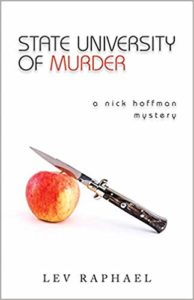 People often ask me at readings, “Where do you get your ideas?” In another context, the writer Lawrence Kushner once wrote, “Entrances are everywhere and all the time.” That’s how I feel about my books: a door can unexpectedly open whether I was looking for one or not. I walk across the threshold and discover a new world.
People often ask me at readings, “Where do you get your ideas?” In another context, the writer Lawrence Kushner once wrote, “Entrances are everywhere and all the time.” That’s how I feel about my books: a door can unexpectedly open whether I was looking for one or not. I walk across the threshold and discover a new world.
After I returned in 2011 from another book tour in Germany, the chair of the English Department at Michigan State University asked if I’d consider teaching for them. I was delighted because I come from a family of teachers and had taught at various schools for over a decade before he contacted me, including two years at MSU after I earned my PhD. He was delighted to have me join the faculty because in his words, I had published more books than any single professor and more than the entire creative writing faculty put together.
Flash forward a few years. One afternoon, my office mate looks shaken and she tells me a terrifying story of an ex-boyfriend breaking into her apartment and roughing up her current boyfriend. The police get involved, there’s a restraining order, but she eventually comes to feel that the department and the university fail her. Soon after, one of my students tells me about being stalked and I quickly realize she’s talking about the same man. She ends up leaving MSU before she can finish her degree because she’s so traumatized by how dilatory and even hostile MSU officials seem to be in dealing with her case.
Then the giant Larry Nassar scandal breaks.
Real people, places, events have never gone directly into my fiction: they’re transformed in myriad ways. The two women I knew were widely covered in the media and their stories raised questions about administrative arrogance, malfeasance, and lack of humanity. Traits that administrators at universities across the country demonstrate all too often. I hear these stories from friends who are teaching, and have heard them whenever I speak at a college or university. Sooner or later somebody tells me about high-handed, grossly overpaid administrators. It’s a national scandal.
In State University of Murder, professor Nick Hoffman has survived a mass shooting to find himself in a renamed department which has been moved to a different building in an attempt to tamp down the bad publicity generated by the shooting. The brand-new new chairman, an import from France, is the height of grandiosity, not surprisingly with a first name like Napoléon. Is he mercurial and contemptuous? Does he alienate nearly everyone he comes into contact with? Does he evoke murderous rage? Absolutely.
As the mystery builds, I pay quiet tribute along the way to the former assistant professor and the student who shared their stories with me.
Lev Raphael is the author of 26 books in genres from memoir to mystery including the just released State University of Murder. His next online creative writing workshop at writewithoutborders is Finding Your Memoir and runs for the month of August.

